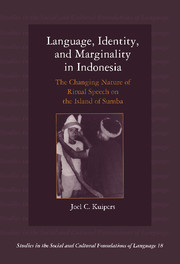 Language, Identity, and Marginality in Indonesia
Language, Identity, and Marginality in Indonesia Book contents
- Frontmatter
- Contents
- List of plates
- List of figures and tables
- Preface
- Acknowledgements
- Notes on orthography
- 1 Introduction
- 2 Place, identity, and the shifting forms of cultivated speech: a geography of marginality
- 3 Towering in rage and cowering in fear: emotion, self, and verbal expression in Sumba
- 4 Changing forms of political expression: the role of ideologies of audience completeness
- 5 Ideologies of personal naming and language shift
- 6 From miracles to classrooms: changing forms of erasure in the learning of ritual speech
- 7 Conclusions
- Notes
- Appendix
- References
- Index
- STUDIES IN THE SOCIAL AND CULTURAL FOUNDATIONS OF LANGUAGE
2 - Place, identity, and the shifting forms of cultivated speech: a geography of marginality
Published online by Cambridge University Press: 05 July 2011
- Frontmatter
- Contents
- List of plates
- List of figures and tables
- Preface
- Acknowledgements
- Notes on orthography
- 1 Introduction
- 2 Place, identity, and the shifting forms of cultivated speech: a geography of marginality
- 3 Towering in rage and cowering in fear: emotion, self, and verbal expression in Sumba
- 4 Changing forms of political expression: the role of ideologies of audience completeness
- 5 Ideologies of personal naming and language shift
- 6 From miracles to classrooms: changing forms of erasure in the learning of ritual speech
- 7 Conclusions
- Notes
- Appendix
- References
- Index
- STUDIES IN THE SOCIAL AND CULTURAL FOUNDATIONS OF LANGUAGE
Summary
What is the role of place in linguistic change? Is there a link between the changing locale of a community of speakers and its social position as marginal or central to the society? If a language is positioned – or conceived to be positioned – on the edge of an island, a nation, a continent, or a trade route, how does that affect its evolution and development? Is it a symptom of decline? In European linguistics, there are certainly some suggestive cases: Gaelic, for instance, is spoken now only in the western and northern tips of Ireland and Scotland (Watson 1989:43). Breton is a language spoken in tiny enclaves of northern France, pushed up against the sea (Kuter 1989: 83). Both of these are widely regarded as languages in decline. Is there some special linkage between the whereabouts of speakers and the status of a language as marginal?
To understand the significance of place for linguistic change, I argue in this chapter that we need to investigate its meaning for the speakers themselves. Location in and of itself does not in any simple way determine the nature of linguistic change, or result in linguistic expansion or decline. Instead, place affects linguistic shifts via linguistic ideologies – local beliefs about language and its characteristics – which mediate the relation between locale and linguistic features. For example, some speakers maintain a strong belief in a linguistic homeland; sometimes this source is viewed as an especially “pure” form of speech; other times it is seen as simply antiquated and marginal.
- Type
- Chapter
- Information
- Language, Identity, and Marginality in IndonesiaThe Changing Nature of Ritual Speech on the Island of Sumba, pp. 22 - 41Publisher: Cambridge University PressPrint publication year: 1998
